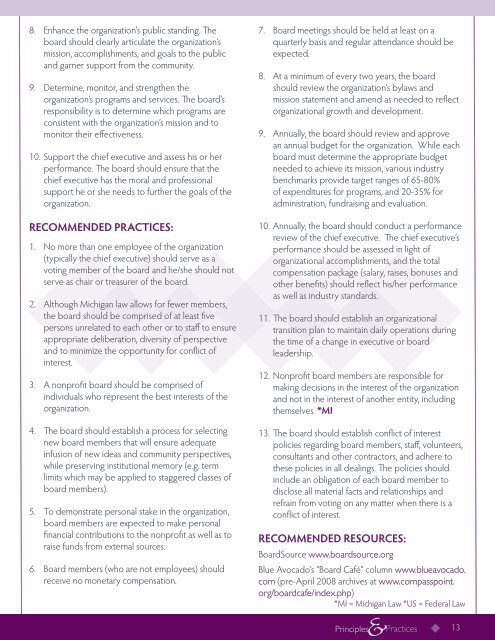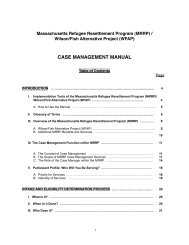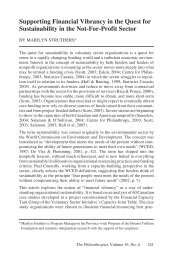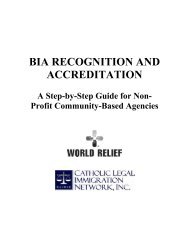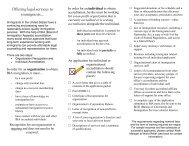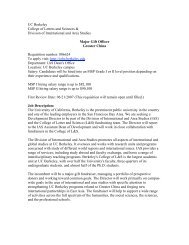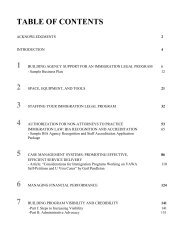Principles & Practices for Nonprofit - NNAAC
Principles & Practices for Nonprofit - NNAAC
Principles & Practices for Nonprofit - NNAAC
Create successful ePaper yourself
Turn your PDF publications into a flip-book with our unique Google optimized e-Paper software.
8.<br />
9.<br />
Enhance the organization’s public standing. The<br />
board should clearly articulate the organization’s<br />
mission, accomplishments, and goals to the public<br />
and garner support from the community.<br />
Determine, monitor, and strengthen the<br />
organization’s programs and services. The board’s<br />
responsibility is to determine which programs are<br />
consistent with the organization’s mission and to<br />
monitor their effectiveness.<br />
10. Support the chief executive and assess his or her<br />
per<strong>for</strong>mance. The board should ensure that the<br />
chief executive has the moral and professional<br />
support he or she needs to further the goals of the<br />
organization.<br />
RECOMMENDED PRACTICES:<br />
1.<br />
2.<br />
3.<br />
4.<br />
5.<br />
6.<br />
No more than one employee of the organization<br />
(typically the chief executive) should serve as a<br />
voting member of the board and he/she should not<br />
serve as chair or treasurer of the board.<br />
Although Michigan law allows <strong>for</strong> fewer members,<br />
the board should be comprised of at least five<br />
persons unrelated to each other or to staff to ensure<br />
appropriate deliberation, diversity of perspective<br />
and to minimize the opportunity <strong>for</strong> conflict of<br />
interest.<br />
A nonprofit board should be comprised of<br />
individuals who represent the best interests of the<br />
organization.<br />
The board should establish a process <strong>for</strong> selecting<br />
new board members that will ensure adequate<br />
infusion of new ideas and community perspectives,<br />
while preserving institutional memory (e.g. term<br />
limits which may be applied to staggered classes of<br />
board members).<br />
To demonstrate personal stake in the organization,<br />
board members are expected to make personal<br />
financial contributions to the nonprofit as well as to<br />
raise funds from external sources.<br />
Board members (who are not employees) should<br />
receive no monetary compensation.<br />
7.<br />
8.<br />
9.<br />
Board meetings should be held at least on a<br />
quarterly basis and regular attendance should be<br />
expected.<br />
At a minimum of every two years, the board<br />
should review the organization’s bylaws and<br />
mission statement and amend as needed to reflect<br />
organizational growth and development.<br />
Annually, the board should review and approve<br />
an annual budget <strong>for</strong> the organization. While each<br />
board must determine the appropriate budget<br />
needed to achieve its mission, various industry<br />
benchmarks provide target ranges of 65-80%<br />
of expenditures <strong>for</strong> programs, and 20-35% <strong>for</strong><br />
administration, fundraising and evaluation.<br />
10. Annually, the board should conduct a per<strong>for</strong>mance<br />
review of the chief executive. The chief executive’s<br />
per<strong>for</strong>mance should be assessed in light of<br />
organizational accomplishments, and the total<br />
compensation package (salary, raises, bonuses and<br />
other benefits) should reflect his/her per<strong>for</strong>mance<br />
as well as industry standards.<br />
11. The board should establish an organizational<br />
transition plan to maintain daily operations during<br />
the time of a change in executive or board<br />
leadership.<br />
12. <strong>Nonprofit</strong> board members are responsible <strong>for</strong><br />
making decisions in the interest of the organization<br />
and not in the interest of another entity, including<br />
themselves. *MI<br />
13. The board should establish conflict of interest<br />
policies regarding board members, staff, volunteers,<br />
consultants and other contractors, and adhere to<br />
these policies in all dealings. The policies should<br />
include an obligation of each board member to<br />
disclose all material facts and relationships and<br />
refrain from voting on any matter when there is a<br />
conflict of interest.<br />
RECOMMENDED RESOURCES:<br />
BoardSource www.boardsource.org<br />
Blue Avocado’s “Board Café” column www.blueavocado.<br />
com (pre-April 2008 archives at www.compasspoint.<br />
org/boardcafe/index.php)<br />
*MI = Michigan Law *US = Federal Law<br />
<strong>Principles</strong><br />
& <strong>Practices</strong><br />
13


